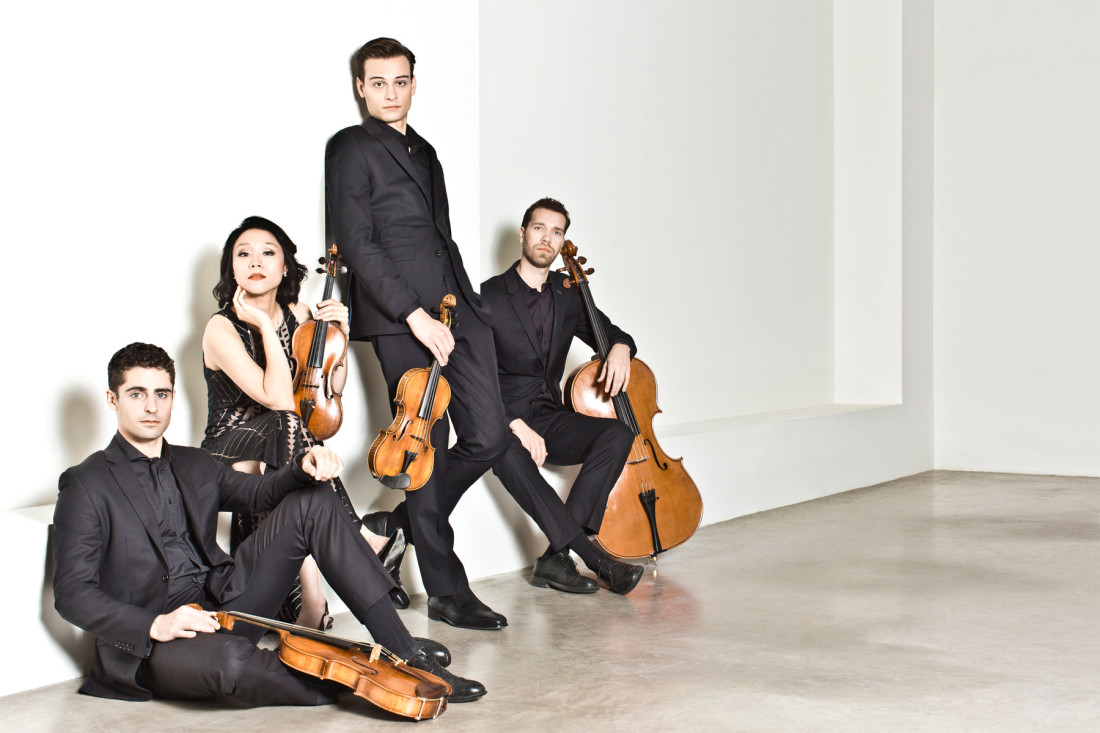In 1945, Austrian composer Hugo Kauder’s String Quartet No. 4 had its American debut at Black Mountain College, the experimental liberal arts institution that flourished 1933-57. Its faculty included some of the era’s most prominent thinkers, including architect and inventor Buckminster Fuller and dancer/choreographer Merce Cunningham. On Friday, Feb. 23, the visiting Tesla Quartet will play Kauder’s String Quartet No. 4, along with works by Maurice Ravel, Carol Gesualdo and Béla Bartók, at a concert at the Black Mountain College Museum + Arts Center.
Hugo Kauder was invited to Black Mountain College in 1945 for a weeklong residency, explains Tesla Quartet cellist Serafim Smigelskiy. “It’s going to be a journey back in time for the audience when we play the piece,” he says, noting that he believes the piece hasn’t been performed in the U.S. since 1945. “It’s exciting to think that these walls have not heard this music all these years, and now it’s back again.”
Formed in 2008 at The Juilliard School in New York City, the Tesla Quartet — inspired by the work of visionary inventor Nikola Tesla — brings together some of the finest classically trained instrumentalists to perform both beloved classics and new pieces. Smigelskiy says that the group is inspired by Tesla’s striving for excellence, his community involvement and his interest in experimentation.
The Tesla Quartet actively encourages all of those values through its Call for Scores program. “We select a new, contemporary work every year,” Smigelskiy says. The competition is open to composers who write for string quartets. “This year, we got 233 submissions, and we’re days away from announcing our winner.” That work will eventually become part of the quartet’s repertoire.
But the Feb. 23 program will be centered on Kauder’s String Quartet No. 4 and Bartók’s popular String Quartet No. 3. Both works were composed in 1927. And, as Kauder’s piece was the winning selection in a Black Mountain College competition, Bartók’s composition earned the first-place award from the Musical Society of Philadelphia. “Those are some of the connections between these two pieces,” Smigelskiy says. “And Both Bartók and Kauder eventually immigrated [to the U.S.] in the aftermath of World War II.” (Bartók spent time in Asheville in 1943-44, where he stayed at the Albemarle Inn and composed his Third Piano Concerto.)
Smigelskiy says that all of the pieces scheduled for the BMCM+AC performance share a theme of “extreme character and variety of expression.” He says that the works — the Kauder and Bartók pieces, plus Ravel and Gesualdo transcriptions by the Tesla Quartet’s violinist, Ross Snyder — all evoke “specific and very intense emotions.”
Smigelskiy continues, “Bartók has Hungarian rhythms and Hungarian folk influences on his music. Kauder has fascinating characters and varied expression in his music. And Ravel is probably the ultimate impressionist composer because he’s known for his gestural music and incredible variety of colors.”
The cellist uses the word “colors” advisedly. “People always ask me, ‘What do you mean by colors in music?’ When we think of impressionism, we think of fine artists who use brush strokes to illustrate something that only human eyes can form into an object,” he says. “I think music can be a bit like that. Instead of using brush strokes, Ravel uses a specific note that he shapes in a unique way. The colors could be bold or faint; there are all these different shades. Ravel explores the spectrum: how each note could be shaped, how unique the sound could be, how it could be extremely different in volume.”
The Tesla Quartet — also featuring violinist Michelle Lie and Edwin Kaplan on viola — is firmly rooted in the classical idiom, but its members sometimes find their playing style informed by popular music as well. “The distinction between classical and nonclassical music is very often hard to pinpoint,” Smigelskiy says. Citing Queen’s “Bohemian Rhapsody,” a work that the Tesla Quartet recently added to its repertoire, he says, “There’s always popular or rock music that is so well-practiced and so thoughtful and complex that it transcends that ‘popular’ label.”
When not touring, the Tesla Quartet is currently based in Hickory for a residency. And the accessible nature of classical music is a quality the Tesla Quartet seeks to communicate in its student outreach programs. “The ultimate achievement is when we’re able to inspire someone through music,” Smigelskiy says. “Passing along an appreciation and love for music — that’s what counts the most.”
WHO: The Tesla Quartet
WHERE: Black Mountain College Museum + Arts Center, 56 Broadway, blackmountaincollege.org
WHEN: Friday, Feb. 23, at 7 p.m. Suggested donation $10-$20





Before you comment
The comments section is here to provide a platform for civil dialogue on the issues we face together as a local community. Xpress is committed to offering this platform for all voices, but when the tone of the discussion gets nasty or strays off topic, we believe many people choose not to participate. Xpress editors are determined to moderate comments to ensure a constructive interchange is maintained. All comments judged not to be in keeping with the spirit of civil discourse will be removed and repeat violators will be banned. See here for our terms of service. Thank you for being part of this effort to promote respectful discussion.